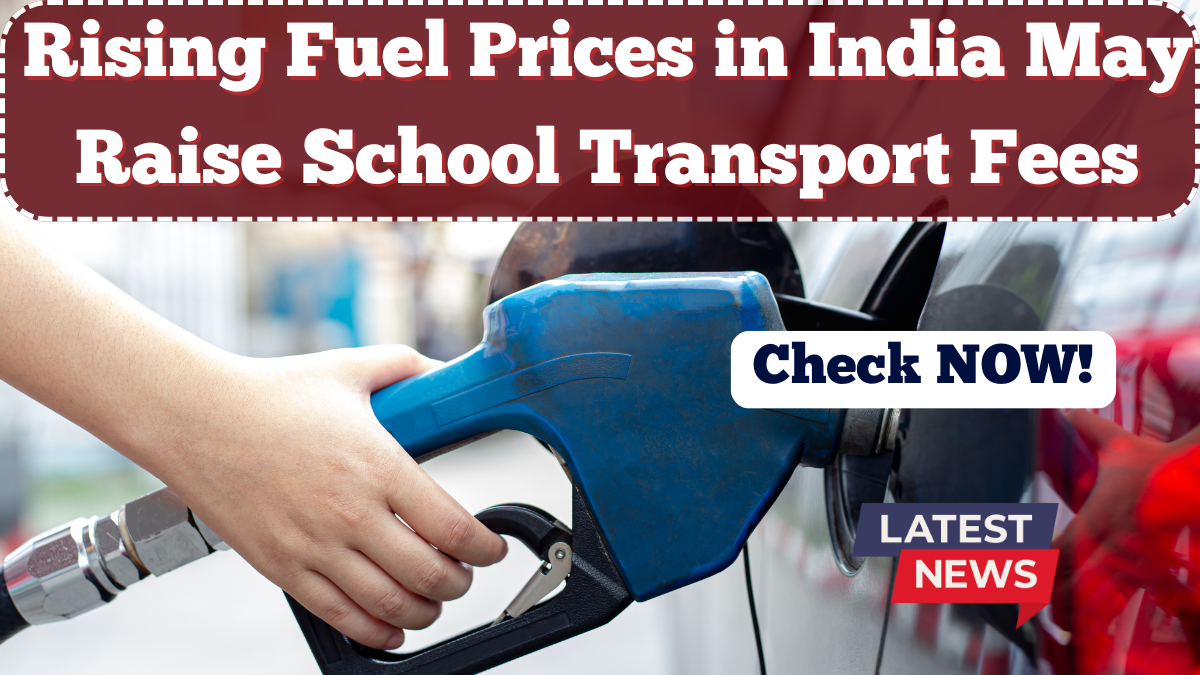The Fuel Price Hike Impact on Schools is becoming increasingly visible across India as transport providers raise monthly school bus fees. With diesel and petrol prices touching record highs in 2025, many private school bus operators are now adjusting their rates to offset operational losses. This change is directly affecting parents, especially in urban areas where most schools rely on outsourced transportation services.
The rising fuel cost has also forced some operators to reduce the number of daily routes or shift to alternate-day pickup models to save fuel. This is causing inconvenience for families and prompting schools to reassess their long-term education transport India strategy.

How Fuel Hikes Are Affecting School Bus Operations
The recent increase in fuel prices has had a cascading impact on school transport logistics. Operators claim that their monthly diesel expenses have gone up by 18–25% since January 2025. Here’s how the fuel price hike impact on schools is playing out:
-
Monthly transport fees have increased by ₹300–₹800 per child
-
Fuel surcharges have been added as a separate line item in many schools
-
Several contractors have demanded renegotiation of fixed-rate school contracts
-
Buses now operate fewer kilometres per litre, impacting cost-efficiency
-
Spare part and maintenance costs have also risen due to inflation
These challenges are prompting schools to explore long-term fixes, including electric buses and carpooling solutions under the education transport India initiative.
Regions Where Transport Fee Hikes Are Highest
According to recent data, the fuel price hike impact on schools is most severe in metro cities and large urban centres. The average monthly school transport fee increase across key cities is as follows:
| City | Avg. Fee Increase (2025) | Common Parent Concerns |
|---|---|---|
| Delhi NCR | ₹700 | Lack of transparency in surcharge amount |
| Mumbai | ₹850 | No alternate transport provided |
| Bengaluru | ₹650 | Increased travel time due to route changes |
| Chennai | ₹600 | Carpool demand on the rise |
| Hyderabad | ₹500 | Partial services and route cuts |
With no sign of fuel prices coming down, parents in these cities are struggling to manage their children’s education transport India expenses.
School Managements Respond to Rising Costs
To handle the fuel price hike impact on schools, many institutions are now offering flexible solutions. These include:
-
Allowing parents to opt out of transport mid-term without penalties
-
Collaborating with app-based school transport aggregators
-
Sharing route maps to help parents organize carpooling groups
-
Starting discussions to adopt electric or hybrid buses from 2026
While these are temporary measures, some schools are investing in longer-term education transport India infrastructure to avoid recurring cost increases.
Suggestions for Parents Facing Transport Fee Hikes
If you’re a parent affected by the fuel price hike impact on schools, here are practical ways to manage costs:
-
Discuss pooling transport with neighbours or other parents
-
Check if the school allows mid-term bus service cancellation
-
Raise concerns with the school’s PTA or transport committee
-
Explore discounted long-term payment options with operators
-
Use school transport complaint helplines in your city if overcharged
Many parents are already engaging with school authorities and demanding transparent cost breakdowns due to the rising fuel cost burden.
FAQs
What is the Fuel Price Hike Impact on Schools in 2025?
The Fuel Price Hike Impact on Schools refers to the increase in school transport fees across India due to rising diesel and petrol prices in 2025.
How much extra are parents paying for school transport?
On average, parents are paying ₹300–₹800 more per month due to the fuel cost surge affecting education transport India systems.
Are schools legally allowed to raise transport fees mid-year?
Yes, many contracts allow it under “fuel surcharge clauses,” which are now being invoked due to the fuel price hike impact on schools.
What alternatives do parents have in 2025?
Parents can explore carpooling, public transit, or request fee flexibility from schools facing the fuel price hike impact on schools.
Is the government offering any relief for school transport?
As of now, there are no direct subsidies, but several state governments are promoting education transport India reforms involving EVs to reduce reliance on fossil fuels.
Click here to know more.
